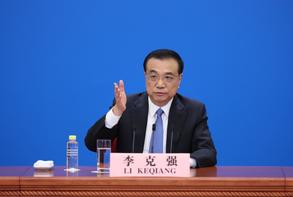 Premier Li Keqiang takes questions from the press via online video at the Great Hall of the People as the third session of the 13th National People's Congress closes on May 28 in Beijing. [Photo/Xinhua]
Premier Li Keqiang takes questions from the press via online video at the Great Hall of the People as the third session of the 13th National People's Congress closes on May 28 in Beijing. [Photo/Xinhua]
BEIJING - China will work to further shorten the time required for starting a business and better regulate the charges on businesses from industry bodies and associations in an effort to lessen corporate burdens and spur their vitality, the State Council's executive meeting chaired by Premier Li Keqiang decided on Wednesday.
Premier Li highlighted the need for transforming government functions and improving the business climate as key steps in China's reform and opening-up
Premier Li highlighted the need for transforming government functions and improving the business climate as key steps in China's reform and opening-up, and major reform measures in properly handling the relations between the government and the market. These reforms must be persistently pushed forward, he said.
The World Bank's Doing Business 2020 released in October ranked China 27th in the ease of starting a business among 190 economies, up by 66 spots from two years ago.
ALSO READ: Capital market opening-up to see renewed impetus
To advance the six priorities where stability is key and the six where protections are needed, the Wednesday meeting urged giving higher priority to supporting market players.
"Facing the mounting economic challenges, we need both fiscal policy measures and deeper reform of government functions for a more enabling business environment to effectively support market players. This way, we could spur greater market vitality," Li said.
The procedures and services for starting a business will be optimized. A unified online platform for accessing these services will be established in every province by the end of this year, where applications can be filed online in a single form. And once approved, related documents can be collected in one single venue.
With strict oversight and security protection put in place, electronic business licenses will be promoted, as a legal and valid identification and means of e-signature for online business registration, tax-related services and opening of bank accounts.
Efforts will be made toward reducing the time required for starting a new business from five to no more than four working days or less.
ALSO READ: China's new round of reform, opening up unleashes potentials
This is both an institutional arrangement and a measure to facilitate business operation under COVID-19 containment. It will help more businesses emerge and keep employment stable.
The Wednesday meeting adopted measures to better regulate the fees charged by industry bodies and associations, and specified five particular instances where unauthorized levy of fees is prohibited.
The World Bank's Doing Business 2020 released in October ranked China 27th in the ease of starting a business among 190 economies, up by 66 spots from two years ago
Industry bodies and associations must not force enterprises to get enrolled and pay fees by using the impact of government departments or their sectoral influence.
The World Bank's Doing Business 2020 released in October ranked China 27th in the ease of starting a business among 190 economies, up by 66 spots from two years ago
READ MORE: Norms eased to lift foreign investments
No unwarranted charges should be introduced on the grounds of one's statutory mandate or government-commissioned matters.
No charges will be allowed on the occasions of contest, performance evaluation or commendation.
Against-regulation charges are banned for certification of professional qualifications.
Charges imposed yet with no services provided or repetitive charging will be forbidden.
"Arbitrary levy of fees must be resolutely dealt with. Some industry bodies and associations are monopolistic in nature and cover a wide range of sectors. The fees they charge are not all reasonable, which has undercut fair competition in the market. Such problems must be promptly addressed," Li said.
READ MORE: Foreign firms to gain broader market access


